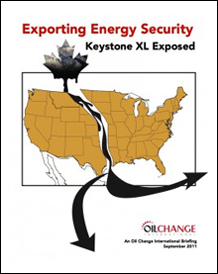TAR SANDS IMBROGLIO—Exporting Energy Security: Keystone XL Exposed
Oil Change International, September 2011
The oil market is fundamentally global. The only way to reduce dependence on foreign oil is to reduce dependence on all oil.
OVERVIEW
TransCanada’s proposed Keystone XL pipeline is a $7 billion project to bring heavy, sour crude oil from tar sands production in Alberta, Canada to Port Arthur, Texas for refining. It has sparked an ongoing struggle as advocates and opponents of the project make their case in various ways to the Obama Administration.
Among the most oft repeated talking points by industry and their allies is the idea that Keystone XL is necessary for American energy security, and that its construction will help wean America of its dependence on Mideast oil. But the idea that Keystone XL will decrease America’s dependence on foreign oil is demonstrably false.
To issue a presidential permit to the proposed Keystone XL pipeline, the Obama Administration’s State Department must find that the pipeline serves the national interest. This report demonstrates compellingly why it does not. On August 25, 2011, Robert Jones, a spokesperson for TransCanada declared: “The U.S. has a decision to make, [d]o they want to import oil from Canada or get conflict oil from OPEC nations?”
On the surface this notion has a clear, if facile, appeal. But an understanding of the changing realities of the oil market in the United States and globally, and a close scrutiny of the oil companies that stand to profit from the pipeline, reveal a completely different story. In fact:
1. The Keystone XL pipeline is an export pipeline. The Gulf Coast refiners at the end of the pipeline’s route are focused on expanding exports, and the nature of the tar sands crude Keystone XL delivers enhances their capacity to do so.
2. Valero, the top beneficiary of the Keystone XL pipeline, has recently explicitly detailed an export strategy to its investors. The nation’s top refiner has locked in at least 20 percent of the pipeline’s capacity, and, because its refinery in Port Arthur is within a Foreign Trade Zone, the company will accomplish its export strategy tax free.
3. The oil market has changed markedly in the last several years, with U.S. demand decreasing, and U.S. production increasing for the first time in 40 years. Higher fuel economy standards and slow economic growth have led to a decline in U.S. gasoline demand, while technological advances have opened up new sources in the United States. Increasingly, U.S. refiners are turning to export.
The oil market is fundamentally global. The only way to reduce dependence on foreign oil is to reduce dependence on all oil.
These facts reveal the important truth that the Keystone XL pipeline would not in fact enhance U.S. energy security at all. The construction of Keystone XL will not lessen U.S. dependence on foreign oil—rather, it will feed the growing trend of exporting refined products out of the United States, thereby doing nothing to enhance energy security or to stabilize oil prices or gasoline prices at the pump. If completed, it will successfully achieve a long-term objective of Canadian tar sands producers—to gain access to export markets.
The oil market is fundamentally global. The only way to truly reduce our dependence on foreign oil is to reduce our dependence on all oil.
This report looks at data from the U.S. Energy Information Administration (EIA), corporate disclosures to investors, and oil market analyst reports. This information should form the basis of the Obama Administration’s deliberations on the Keystone XL pipeline. An honest assessment of the Keystone XL project will show that the oil will be exported and will not benefit U.S. consumers or any reasonable definition of the nation’s interest.
Download: Exporting Energy Security: Keystone XL Exposed (PDF, 1.69 M)
Read More: Business, Economy, Energy, Environment, Security, Sustainability, Tax, Trade, Transportation, Canada, United States, Americas, Asia, Global, Middle East
|
ACHTUNG! ACHTUNG! (Hmm…that got your attention, uh?) Did you like this article? Then buy us a beer. How many times do we have to beg you? The wingnuts and fascists are falling over each other to make donations…to their filthy causes. We, on the other hand, take our left blogs for granted. |
|---|
| Just think how much money you spend on beer, cigs, trinkets and other useless stuff that can also kill you. |
| Use the DONATE button below or on the sidebar. And do the right thing. Even once a year. |
Use PayPal via the button below.
THANK YOU.



